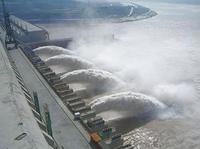-
China admits to critical flaws at world’s largest dam
Last week, the Chinese government made a rare announcement and publicly admitted that there were critical problems at the Three Gorges dam, the world’s largest hydroelectric dam, lending support to the growing opposition to future dam projects; with the approval of Chinese Premier Wen Jiabao, the country’s second in command, last Thursday the State Council announced that the Three Gorges dam had been plagued by a series of problems “urgently in need of resolution”; problems include ecological deterioration, geological disasters, and the lingering uncertain status of more than one million people displaced by the dam; this is the first time such a high-ranking government official has publicly acknowledged the dam’s problems
-
-
Western states could face disastrous floods from record snowpacks
Western states could soon face disastrous floods like the Midwest due to record snowpacks; heavy winter storms and an abnormally cold and wet spring have resulted in record snow levels for May in states across the west including Montano, New Mexico, Colorado, and California; officials worry that if June is particularly hot and sunny, the snow could melt too quickly and inundate the region’s rivers with torrents of water; officials are particularly concerned about flash floods as they can occur with little warning; officials are bracing for the worst holding emergency drills and releasing thousands of gallons of water to make room in reservoirs
Western states could soon face disastrous floods like the Midwest due to record snowpacks -
-
Tornado kills at least 116 in Joplin, Missouri
Residents and emergency responders are searching for survivors in Joplin, Missouri after a tornado tore through the town Sunday evening; the tornado tore a 6-mile-long, half-mile wide path through the middle of town; much of the city’s south side was leveled, with churches, schools, businesses, and homes reduced to ruins by winds of up to 165 mph; so far 116 people have been found dead, and officials expect the death toll to rise; officials have estimated 2,000 buildings were damaged; among the ruined buildings is St. John’s Regional Medical center, the city’s major hospital; the hospital was struck directly by the tornado and lost portions of its roof, façade, and windows; the Joplin twister was one of 68 reported tornadoes across seven Midwest states over the weekend
-
-
Hydropower gaining traction around the world

As more nations turn to renewable energy sources, wind and solar have often grabbed all the attention, but hydropower has been steadily making quiet gains. While hydroelectricity is becoming more prevalent, its future is riddled with uncertainty and difficult questions; in 2008, hydroelectricity generated more than 250 billion kilowatthours of electricity, roughly 67 percent of all renewable energy produced that year; new dam projects are also generating a lot of criticism from environmentalists and local residents who worry about the people who will be displaced as well as the dams’ environmental impacts; ironically hydroelectric dams will be affected by climate change, the very thing it is designed to combat
-
-
Risk of wetland habitat loss in southern United States
Between 1992 and 1997, more than 500,000 acres of wetlands were lost in the United States; 75 percent of those losses were attributed to development or agriculture; the greatest loss during this period occurred in the southern United States, with development as the main reason for wetland habitat loss; wetlands are important not only as a habitat for wild life, but as a line of defense against catastrophic floods and intense storms
-
-
Using river sediment to repair the coast

The water of the Mississippi River swells beyond levees and flood-control barriers, flooding large areas, destroying costly infrastructure assets, and inflicting economic harms; not all is bad, though: large floods like the current one carry huge quantities of sediment that eventually deposit on the riverbed, making the river shallower, or are carried out to the Gulf of Mexico; the vast amount of water going south will replenish Louisiana’s coastal wetlands, and the sediment carried by the water will restore long stretches of eroding coastline and rebuild barrier islands in the Gulf
-
-
Following Fukushima: how much radioactivity in the Oceans?
A result of the loss of electricity at the Fukushima nuclear plant in Japan on 11 March, overheating led to significant releases of iodine, cesium, and other radioisotopes to the environment; Japanese officials recently raised the severity of the nuclear power plant incident to level 7, the highest level on the international scale and comparable only to the Chernobyl incident twenty-five years ago; the National Science Foundation awards rapid-response grants to establish ocean radionuclide levels from Fukushima
-
-
Severe tropical droughts as northern temperatures rise
A sediment core from a South American lake revealed a steady, sharp drop in crucial monsoon rainfall since 1900, leading to the driest conditions in 1,000 years as of 2007 and threatening tropical populations with water shortages; a 2,300-year climate record researchers recovered from an Andes Mountains lake reveals that as temperatures in the Northern Hemisphere rise, the planet’s densely populated tropical regions will most likely experience severe water shortages as the crucial summer monsoons become drier
-
-
Direct removal of carbon dioxide from air infeasible
A group of experts looked at technologies known as Direct Air Capture, or DAC, which would involve using chemicals to absorb carbon dioxide from the open air, concentrating the carbon dioxide, and then storing it safely underground; they conclude that these technologies are unlikely to offer an economically feasible way to slow human-driven climate change for several decades
-
-
U.S. agriculture escaped impacts of global warming -- for now

Global warming is likely already taking a toll on world wheat and corn production, according to a new study led by Stanford University researchers, but the United States, Canada and northern Mexico have largely escaped the trend; the researchers found that global wheat production was 5.5 percent lower than it would have been had the climate remained stable, and global corn production was lower by almost 4 percent; Global rice and soybean production were not significantly affected
-
-
What past rises of sea levels tell us about future rises
During a period of high atmospheric carbon dioxide levels three million years ago — the mid-Pliocene climate optimum — sea levels were anywhere between 15 and 100 feet higher than at present because water that is now locked up in glaciers as ice circulated freely through the oceans; by understanding the extent of sea level rise three million years ago, scientists hope more accurately to predict just how high the seas will rise in the coming decades and centuries due to global warming
-
-
Study finds natural gas releases twice as much greenhouse gas as coal
A new study shows that natural gas is not as environmentally friendly as previously thought, dealing a major blow to environmentalists who viewed it as a “bridge fuel” to cleaner energy alternatives; researchers found that the greenhouse-gas footprint of shale gas over a twenty year period was at least 20 percent higher than coal and could even be “more than twice as great”; the study was quick to draw criticism from oil and gas companies for its use of shoddy data; the study also outlines multiple ways that the oil and gas companies could reduce methane emissions by up to 90 percent during the drilling process
-
-
West Texas towns face impending water shortage
West Texas is facing a dire drought that has local officials scrambling to find additional sources of water for thirsty residents; since last October, West Texas has only seen about one-tenth of an inch of rain, and now two of the three reservoirs that cities in the Permian Basin depend upon are nearly empty; the third reservoir is 30 percent below capacity; without significant rain soon, all three reservoirs will be dry by January 2013; residents have been restricted to only three days of outdoor watering; the region faces limited options for additional sources of water and plans will be expensive to implement
-
-
Busy hurricane season ahead for U.S.
Forecasting organizations predicts that the coming hurricane season in the United States will see 15 named storms, 8 hurricanes, and 4 intense hurricanes (category 3 or greater); these 2011 forecast numbers are above the long-term (1950-2010) averages of 12 named storms, 7 hurricanes, and 3 intense hurricanes
-
-
U.K. struggles to reduce water usage as supplies dwindle

An uncharacteristically warm and dry spring in the United Kingdom has forced water companies to begin conserving water, but a recent survey indicates that the method currently employed is widely unpopular and grossly affects low income families; some reservoirs are 20 percent below normal levels and eleven rivers are at their lowest in twenty years; in 1989 the British government mandated that all new homes have water meters installed and introduced a usage plan which charges households based on the amount of water they consume; the plan has proven effective in reducing water usage, but costs have increased by more than 50 percent
-
- All
- Regional
- Water
- Biometrics
- Borders/Immig
- Business
- Cybersecurity
- Detection
- Disasters
- Government
- Infrastructure
- International
- Public health
- Public Safety
- Communication interoperabillity
- Emergency services
- Emergency medical services
- Fire
- First response
- IEDs
- Law Enforcement
- Law Enforcement Technology
- Military technology
- Nonlethal weapons
- Nuclear weapons
- Personal protection equipment
- Police
- Notification /alert systems
- Situational awareness
- Weapons systems
- Sci-Tech
- Sector Reports
- Surveillance
- Transportation
Advertising & Marketing: advertise@newswirepubs.com
Editorial: editor@newswirepubs.com
General: info@newswirepubs.com
2010-2011 © News Wire Publications, LLC News Wire Publications, LLC
220 Old Country Road | Suite 200 | Mineola | New York | 11501
Permissions and Policies
Editorial: editor@newswirepubs.com
General: info@newswirepubs.com
2010-2011 © News Wire Publications, LLC News Wire Publications, LLC
220 Old Country Road | Suite 200 | Mineola | New York | 11501
Permissions and Policies
